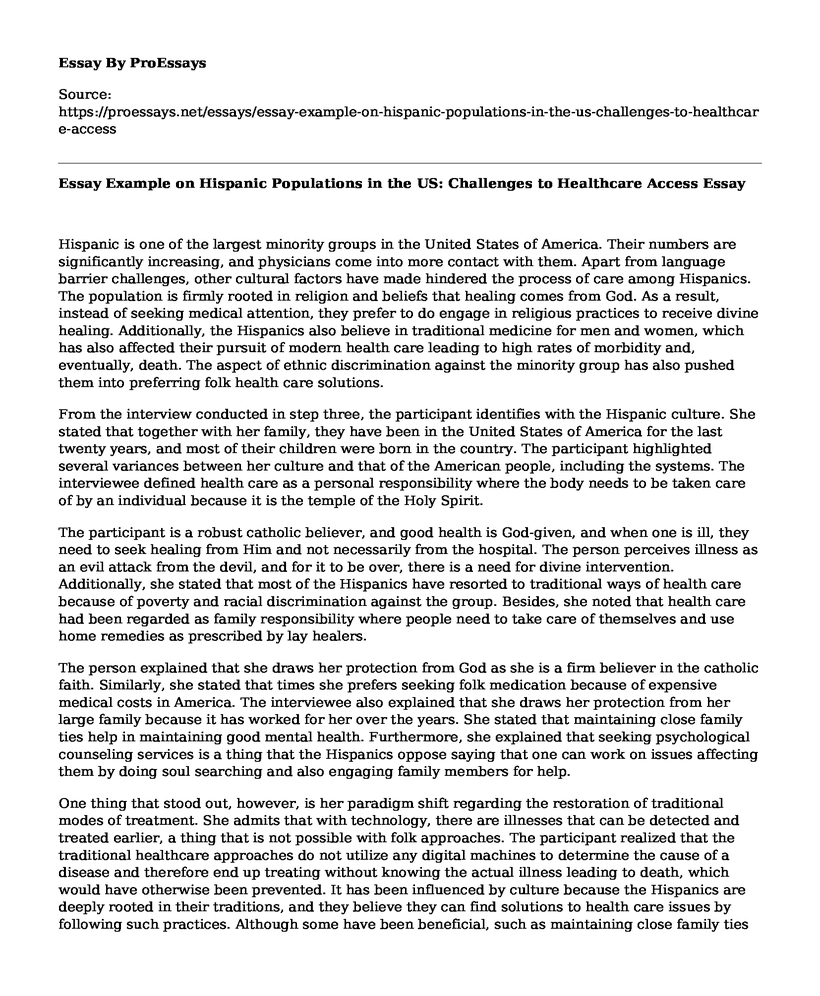Hispanic is one of the largest minority groups in the United States of America. Their numbers are significantly increasing, and physicians come into more contact with them. Apart from language barrier challenges, other cultural factors have made hindered the process of care among Hispanics. The population is firmly rooted in religion and beliefs that healing comes from God. As a result, instead of seeking medical attention, they prefer to do engage in religious practices to receive divine healing. Additionally, the Hispanics also believe in traditional medicine for men and women, which has also affected their pursuit of modern health care leading to high rates of morbidity and, eventually, death. The aspect of ethnic discrimination against the minority group has also pushed them into preferring folk health care solutions.
From the interview conducted in step three, the participant identifies with the Hispanic culture. She stated that together with her family, they have been in the United States of America for the last twenty years, and most of their children were born in the country. The participant highlighted several variances between her culture and that of the American people, including the systems. The interviewee defined health care as a personal responsibility where the body needs to be taken care of by an individual because it is the temple of the Holy Spirit.
The participant is a robust catholic believer, and good health is God-given, and when one is ill, they need to seek healing from Him and not necessarily from the hospital. The person perceives illness as an evil attack from the devil, and for it to be over, there is a need for divine intervention. Additionally, she stated that most of the Hispanics have resorted to traditional ways of health care because of poverty and racial discrimination against the group. Besides, she noted that health care had been regarded as family responsibility where people need to take care of themselves and use home remedies as prescribed by lay healers.
The person explained that she draws her protection from God as she is a firm believer in the catholic faith. Similarly, she stated that times she prefers seeking folk medication because of expensive medical costs in America. The interviewee also explained that she draws her protection from her large family because it has worked for her over the years. She stated that maintaining close family ties help in maintaining good mental health. Furthermore, she explained that seeking psychological counseling services is a thing that the Hispanics oppose saying that one can work on issues affecting them by doing soul searching and also engaging family members for help.
One thing that stood out, however, is her paradigm shift regarding the restoration of traditional modes of treatment. She admits that with technology, there are illnesses that can be detected and treated earlier, a thing that is not possible with folk approaches. The participant realized that the traditional healthcare approaches do not utilize any digital machines to determine the cause of a disease and therefore end up treating without knowing the actual illness leading to death, which would have otherwise been prevented. It has been influenced by culture because the Hispanics are deeply rooted in their traditions, and they believe they can find solutions to health care issues by following such practices. Although some have been beneficial, such as maintaining close family ties for good mental health, others are backward and have led to adverse health effects among the minority group.
Conclusion
Language has been the significant communication barrier between the Hispanics and the health care professionals because they cannot express themselves and be understood. A majority of them cannot speak in English, a language that is commonly spoken by the health care professionals, and as a result, they can explain what they are suffering from and even prefer no going to the hospital. Also, their deep roots in their old traditions and religion have also made them not believe in modern health care and advice from health care professionals.
References
Johnson, M. J., & Farquharson, H. R. Hispanic culture and healthcare in the United States: One person’s perspective.
Velasco-Mondragon, E., Jimenez, A., Palladino-Davis, A. G., Davis, D., & Escamilla-Cejudo, J. A. (2016). Hispanic health in the USA: a scoping review of the literature. Public health reviews, 37(1), 31.
Cite this page
Essay Example on Hispanic Populations in the US: Challenges to Healthcare Access. (2023, Aug 08). Retrieved from https://proessays.net/essays/essay-example-on-hispanic-populations-in-the-us-challenges-to-healthcare-access
If you are the original author of this essay and no longer wish to have it published on the ProEssays website, please click below to request its removal:
- Close Relationships in Psychology Paper Example
- African Americans: Striving for Prosperity in a Diverse Society - Essay Sample
- Paper Example on Trade, Politics, and the Great Game: The Eastern Question Explored
- Essay Example on Interpersonal, Verbal & Written Communication: Strengthening Relationships
- Report Example on Immigration to the US: The Dreamers and the DREAM Act
- Gaming Industry - Free Report Example
- Free Essay Sample on White Skin Color







